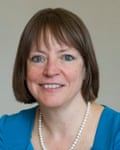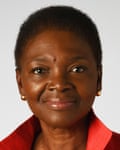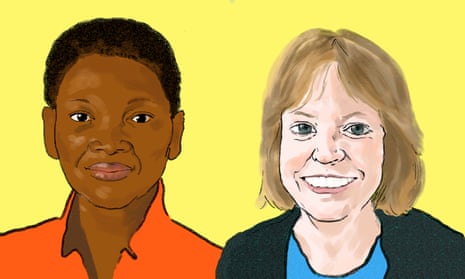On the surface at least, women are thriving in British universities. Female students now outnumber men in almost two-thirds of subjects, and nearly half of all academics are women. But a closer look at the figures show that the higher echelons of academia continue to be stacked with men. Only 24% of professors are women, according to the latest data from the Higher Education Statistics Agency. And while this number has been slowly creeping up overall, a number of major universities, including Loughborough and the London School of Economics, have seen their numbers of female professors decline since 2012-13. Meanwhile, universities are still overwhelmingly likely to be run by a man. Although more women have been breaking through, particularly in the last few years, there are still only 27 women vice chancellors.
Are women academics being blocked by the system? Or are there ways that they can take more control of their own careers? In the latest of our 2VCs series, Anna Fazackerley meets Valerie Amos, director of London University’s School of Oriental and African Studies (Soas), and Shearer West, vice-chancellor of Nottingham University.
Amos is no stranger to smashing through glass ceilings. When she took over at Soas last year she became the first black woman to head a British university. She is a Labour peer and hasn’t come up through the academic ranks. She became the first British cabinet minister from an African-Caribbean background as international development secretary in 2003, has been leader of the House of Lords – and most recently held a top post in the United Nations.
West took over as vice-chancellor of Nottingham University in October this year. She is the first woman to head the university, which is a member of the elite Russell Group of research-intensive institutions. In contrast to Amos she has taken a more traditional route to the top, with leadership positions in other Russell Group universities including Sheffield, Oxford and Birmingham, as well as the Arts and Humanities Research Council.
Are things beginning to change at the top in academia?
Shearer West reminds us that just a few years ago the number of women vice-chancellors in Russell Group universities was a shocking zero. “Now it has six, so we are heading for the 30% club, which is good,” she says. But less than three months after taking the reins at Nottingham she is in no doubt that gender stereotypes are alive and well in academia.
“I’ve had several experiences now since I’ve been doing this job, where I’ve been standing in a room and the VIP comes in and I’m standing next to a man – the man could be anybody – and the VIP puts his hand out to the man and says, ‘Vice chancellor nice to meet you’” she says.
“I do know I don’t really look like a vice chancellor,” she adds, laughing. But of course this isn’t the point. She wants women to keep fighting for the top jobs in academia, until people no longer expect the title to come with a beard or a tie. I ask them whether their path to the top has been an easy one.
“I don’t think any woman would say she had an easy ride,” Amos snorts. “It just doesn’t happen. There’s a huge amount of slog, a bit of luck relating to timing mostly, and it’s about getting the right support. In my career, friends, family and mentors have all been so important.”
West agrees that getting a high-level university position is always hard. She admits that although she has had leadership roles in five different organisations,
“I’ve had a lot of failures along the way”. She adds: “But I did learn to move on, and that was the best thing I ever did. And if I’m honest, I don’t think in either of those cases not getting the job had anything to do with being a woman.” Why aren’t there more female leaders at the top in universities?
Although Amos hasn’t come up through the academic system herself, she says that she has seen some clear trends emerging. One thing that seems to send some women off course is – ironically – their dedication. Amos says senior women are more likely to volunteer for difficult additional tasks to support the university, and that inevitably sucks up time that colleagues – especially male ones – will be spending on their research. “In a university where your research profile is crucial that can have an impact on promotion,” Amos admits. “We need to look hard at how we promote – and when we encourage women to apply for things.”
Shearer recognises this “very strong sense of responsibility” in women academics. But she is most concerned about women being more reluctant than men to put themselves forward. “A lot of that has to do with a kind of perfectionism. They will wait until they think every single box is ticked before applying for a promotion.”
In her roles at Birmingham and Oxford, she held “myth-busting” workshops on what evidence promotion panels will actually accept. It worked. More women applied, got the jobs in open competition, and the numbers went up.
She intends to do this at Nottingham, too, and her team are already scrutinising the whole recruitment process to work out where unconscious bias might creep in. This often involves small changes like changing the language in adverts if it is putting women off. But she isn’t afraid to intervene if things aren’t appearing equal. “If we aren’t getting the percentage of women applying that we want, we push it back and have a look to see what’s going on,” she says.
What proportion of your professors are women?
Both vice-chancellors are very open that they have a long way to go on this one. Amos says that at Soas things look good on the surface, with a high proportion of women across the whole institution. But if you strip out the support roles, men have about 60% of academic positions, and only 28% of professors are women. “It’s really patchy and we feel very strongly that we have a lot of work to do,” she says.
It is a similar story at Nottingham: 54% of academics are women, but only 20% of professors. In apologising for this figure, which she very much wants to increase, West explains that academics tend to love the institution and stay for “many, many years” – a headache in equality terms, because in the 1980s and early 90s she says the people hired were predominately men.
Is there a danger that you will demotivate men by pushing for female promotions?West is diplomatic: “I’m talking about trying to make the whole process as fair as possible for everybody. We are trying to take bias of all kinds out and just look for talent.”
But Amos is unequivocal. “I think for a place like Soas, which prides itself on values and inclusiveness, it’s important I am not embarrassed to be a champion. I care passionately about gender equality. I care passionately about diversity and inclusion, and I think it’s important that people see that.”
She agrees that there are lots of processes that can be tweaked to improve equality. Yet she says there are also much harder questions to ask about the culture in your institution. “How does it feel? Do women feel comfortable in your institution? Who dominates the agenda in departments?”
What advice would you give to younger women starting out in academia?
“I would say be very careful about making yourself a victim,” West says. “If you get overlooked – which you will do because it’s a rough, competitive world and it happens – don’t automatically take the role of a victim. I work with a lot of women’s networks and often they can get into a negative frame of mind.” She says that women need both mentors and sponsors to help them navigate their careers.
Amos nods vigorously. “I entirely agree. In any sector you need mentors and supporters and promoters; people who will point you in directions you hadn’t thought about. That is incredibly important. Environments can be hostile and you need to know how to bounce back.”
She adds that often women may be turned down for a job they feel they deserve not because of their gender, but because someone else performed better on the day. “The trouble is, because we are in a society that has structural discrimination against women, it is hard to tease out what is what. I think women also want to see that the culture is changing, that society is changing – and that’s the hard bit because that can be so slow.”
When West took over as VC of Nottingham, she set up a private email address for staff to share their concerns or thoughts about the university with her directly. She says that people told her she was mad to do this – and reading and acknowledging every one of the hundreds of emails she has received has been very time-consuming. “People have poured their souls out,” she says, and the exercise has taught her a lot about the institution she now runs. I wonder whether she was more likely to take on this listening exercise because she is a woman.
Do you bring any particularly female strengths to the leadership role?
“I hesitate to describe myself,” West says, “but I have done 360 degree feedbacks – and the things that come out are that I am courageous, able to listen, emotionally intelligent and I have no aversion to change. You might classify those qualities as non ego-driven.” But she is quick to add that she doesn’t like the idea of branding certain characteristics “female”. She thinks it is society that makes men and women different, rather than the differences being an essential part of us.
Amos jumps in: “Every time we try to say this is a female or male quality, we just get ourselves into trouble. The important thing is how you push yourself.” She adds that she too has done lots of psychometric tests during her career and she thinks they are most useful for forcing you out of your comfort zones. “The biggest thing is not to get stuck. Have an appetite to change, to look at things differently,” she says.
Do men’s academic careers go stellar in their 30s, while many female academics take time out to start a family?
Both vice-chancellors are adamant that having a family is compatible with being a successful academic. West points out that she has done it herself – including a spell out of academia on maternity leave. “It’s never going to be simple if you take time out, whether that’s to have a baby or to care for someone or because you have an illness. It’s our responsibility as a university to make sure staff have a positive transition back in.”
Yet she argues that academia is actually more flexible than other sectors. “When I had my child I had friends who were professionals in other areas and I found I was in a supportive community compared to them. As long as you get done what you need to get done in a university you have a lot more flexibility than, say, someone who is teaching in a school.”
Amos adds that the tradition of people taking sabbaticals means that universities are more used to being flexible. “At Soas, I think it feels supportive,” she says. But she admits that her own career would probably have been different if she’d had children. Not least in her recent United Nations job, where she travelled two weeks out of every three, and often to very inhospitable places.
What does #MeToo mean for universities?
Amos says universities had already been trying to guard against sexual harassment – of both students and staff – long before Weinstein hit the papers.
She says most already hold workshops on issues such as consent, and try to educate freshers about acceptable behaviour. Soas has been particularly hot on this, taking a stand last year by publishing a guide to preventing and responding to gender-based violence, with Amos insisting that they would take action to keep female students safe. She stands fully behind the women who are speaking out now.
“The reason I am so pleased about what has been happening recently is that it is helping to lift the lid on what is a deeply embedded problem in our society,” she says. “Some people are trying to say enough already, but we need to understand the differences between sexual harassment and sexual violence and how one can slide into another. I hope this will help women to be firm, to say no, to understand that this is not about them, that there is something bigger going on out there.” She adds that universities will have to wrestle with some of the new challenges that emerge, such as young men who are nervous about how to behave.
West adds that she is relieved that things that were tolerated when she was younger are no longer acceptable. She warns that universities need to take a clear stand against sexual harassment. “We are a liberal environment, but we need to make clear the expectations we have about behaviour for our staff and our students.”
Shearer West

What was your first degree and where did you study?
BA History of Art (major), English (minor), College of William and Mary, Virginia
What is your secret vice?
Fine wine
What is your signature dish?
Asparagus risotto
Name three things you love about your university city
The culture (Lakeside Arts, Nottingham Contemporary, Nottingham Playhouse, Unesco City of Literature), the canals, and the three beautiful, green university campuses: University Park, Jubilee and Sutton Bonington
What would you like for Christmas?
A long lie in
What book is on your bedside table?
Voltaire’s Candide
What did you want to be when you were 18?
A novelist
Valerie Amos

What was your first degree and where did you study?
Sociology, University of Warwick
What is your secret vice?
Dancing
What is your signature dish?
Fish in coconut sauce
Name three things you love about your university city
I love the vibrancy, eccentricity and cultural mix of London
What would you like for Christmas?
I want a family Christmas where we celebrate each other and with each other as well as remember those no longer with us. It’s always a special time in our family
What book is on your bedside table?
I always have more than one. Currently Barbara Hosking, Exceeding My Brief; Human Rights Futures, edited by Stephen Hopgood, Jack Snyder and Leslie Vinjamuri; Yaa Gyasi, Homegoing
What did you want to be when you were 18?
I wasn’t particularly focused on what I wanted to be, but more on what I wanted to do. I wanted to change the world
Join the higher education network for more comment, analysis and job opportunities, direct to your inbox. Follow us on Twitter @gdnhighered. And if you have an idea for a story, please read our guidelines and email your pitch to us at highereducationnetwork@theguardian.com
Looking for a higher education job? Or perhaps you need to recruit university staff? Take a look at Guardian Jobs, the higher education specialist

Comments (…)
Sign in or create your Guardian account to join the discussion